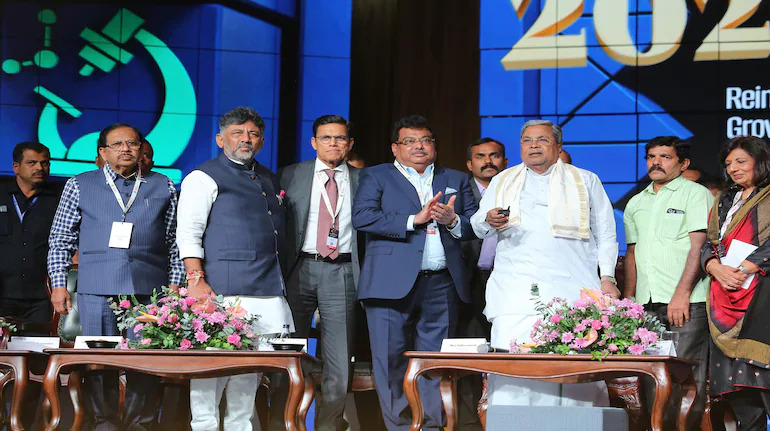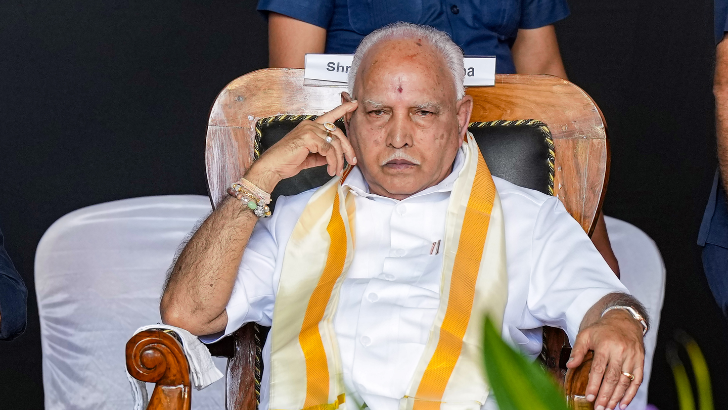Karnataka unveils new industrial policy to become top investment destination
A key objective is to ensure balanced growth across regions by promoting industrial development beyond Bengaluru, particularly in backward areas.
PTI
-
Deputy Chief Minister DK Shivakumar on Tuesday unveiled Karnataka’s Industrial Policy 2025-30
BENGALURU, 11 FEB
Deputy Chief Minister DK Shivakumar on Tuesday unveiled
Karnataka’s Industrial Policy 2025-30 at the inaugural event of Invest
Karnataka 2025 summit here.
The policy aims to position the state as the top
destination for high-technology manufacturing investments in Asia.
Speaking on the occasion, Shivakumar said the policy
focuses on equitable and sustainable development, targeting Rs 7.5 lakh crore
in investments and aiming to generate 20 lakh new jobs during the policy
period.
A key objective is to ensure balanced growth across
regions by promoting industrial development beyond Bengaluru, particularly in
backward areas, he added.
Highlighting the key features of the policy, Large and
Medium Industries Minister MB Patil said, "To achieve this objective, the
policy classifies districts into three zones. Zone-1 and Zone-2 include
industrially backward taluks and districts, which will receive differential
incentives to encourage investments."
Bengaluru Urban and Rural districts fall under Zone-3,
which has a different incentive structure to ensure targeted support for
industries in less developed areas, Patil explained.
A statement issued by the minister’s office said the
policy identifies key focus sectors that will drive economic development and
job creation across Karnataka.
These key sectors include aerospace and defence,
electronics, core manufacturing (steel, cement, metals), warehousing and
logistics, textiles, global capability centres, future mobility, green
hydrogen, industrial robots, drones, augmented reality/virtual reality, medical
technology, space technology, biotechnology, renewable energy, pharmaceuticals,
automobiles, capital goods, FMCG, and tourism.
The policy offers financial incentives by allowing
investors to choose between Capital Subsidy and Production-Linked Incentives.
"The policy ensures world-class infrastructure by
promoting Public-Private Partnership collaborations and supporting dormitories
and affordable housing for ultra-mega investments," Patil was quoted, as
saying.
To enhance ease of doing business, the government has
revamped the Single Window System with simplified processes for industrial
permits and approvals, the minister explained.
"Additionally, the policy focuses on human capital
development by fostering industry-government-academia collaboration. It
introduces short-term and long-term curricula for ITIs and polytechnics to create
a future-ready workforce," Patil noted.
The policy promotes sustainability by developing Green
Industrial Areas and incentivizing green initiatives by investors, the
statement said.
It also boosts innovation by strengthening the research
and development (R&D) and startup ecosystem while establishing KWIN City
(Knowledge, Wellbeing & Innovation City) as a hub for knowledge,
healthcare, innovation, and research, it added.
Further, the policy ensures inclusive development by
strengthening the Micro, Small, and Medium Enterprises (MSME) ecosystem through
infrastructure support, incentives for women entrepreneurs, and industrial
cluster development in backward regions.
Additionally, it reinforces governance through regular
monitoring to ensure transparency and seamless execution, the statement read.
"Providing a major push for MSMEs, the policy
introduces an affidavit-based (ABC) approval system and a simplified Single
Window Clearance System to streamline approvals. It earmarks 30 per cent of
industrial area land for MSMEs, with 24.1 per cent of alloted land reserved for
SC/ST entrepreneurs," the statement said.
According to the policy, the government will also support
MSMEs through vendor development conclaves, marketing support in public
procurement, technology upgradation assistance, skill development initiatives,
MSME Manufacturing Excellence Awards, and cluster development programmes.
The policy also offers attractive incentives and
concessions to encourage industrial growth and entrepreneurship.
"The Karnataka Industrial Policy 2025-30 sets a clear roadmap for the state’s industrial future. With a strong emphasis on sustainability, regional balance, MSME empowerment, and innovation, the policy aims to keep Karnataka at the forefront of industrial growth. It is expected to create widespread employment and economic opportunities across the state," Patil emphasised.
Leave a Reply
Your email address will not be published. Required fields are marked *














 (1).jpg)
.png)




